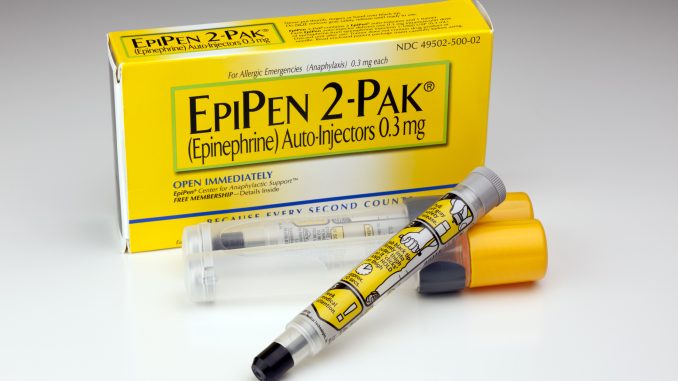
By Hank Russell
The Republican-majority Nassau County Legislature blocked a bill that would have required police officers to carry epinephrine auto-injectors in their patrol cars, much to the dismay of the Democrats.
As previously published in Long Island Life & Politics, Legislator Seth Koslow (D-Merrick) introduced legislation that would have patrol officers carry Epi-Pens with them in their vehicles. It would also provide officers with the necessary training to administer them during emergencies. A similar bill introduced by Dominick Thorne (R-Patchogue) was passed by the Suffolk County Legislature, as LILP also reported. The state passed an amendment that allowed Suffolk to adopt Gio’s Law, named after a 14-year-old boy, Gianno “Gio” Cipriano. who died of an allergic reaction in 2013.
Koslow pointed out Governor Kathy Hochul recently signed legislation that caps Epi-Pens at $100 apiece. “Equipping our police officers with EpiPens is not just common sense—it’s a moral imperative,” he said. “For just $100 per EpiPen—a cost that could be further reduced through bulk purchasing agreements—we could save lives across Nassau County. Blocking this legislation is fiscally shortsighted and morally indefensible.”
The legislation includes training for police officers, which takes only 15 to 30 minutes to complete and can be easily integrated into their existing schedules. If the bill were to pass, Nassau police would have to equip their vehicles with the medicine within 120 days after passage.
“We already trust our officers with life-saving responsibilities,” added Legislator Delia DeRiggi-Whitton (D-Glen Cove), the Legislature’s Minority Leader. “Training them to administer epinephrine during emergencies is a straightforward process. It’s a small investment of time and resources with enormous potential to save lives. Families in Nassau County deserve this peace of mind.”
Epi-Pens are used to treat anaphylaxis, a severe and potentially fatal allergic reaction, which can cause death within minutes if not treated immediately. Five hundred to 1,000 lives are lost annually in the United States to anaphylaxis. According to the Centers for Disease Control and Prevention (CDC), 33% of adults and 25% of children have at least one allergy, and 6% of U.S. adults and children are affected by food allergies. In New York alone, more than 218,000 students live with life-threatening food allergies, according to Food Allergy Research and Education (FARE). Further, one in six need emergency care for severe allergic reactions,
Cipriano’s mother, Georgina Cornago, who has turned her personal tragedy into a mission to protect others from suffering the same loss. “Every second counts during an allergic emergency,” said Cornago. “Just as AED machines are now standard in public spaces, EpiPens should be readily available to first responders. This legislation ensures that help will be there when it’s needed most, and it gives families like mine peace of mind.”
Despite broad community support and the clear need for this initiative, Koslow said, the Republican majority in the Nassau County Legislature has failed to act.
“This is not about politics—it’s about saving lives,” said Koslow. “The state has made it possible for us to act, and other counties have already stepped up. Nassau County families shouldn’t have to wait any longer for common-sense solutions to prevent tragedies.”
DeRiggi-Whitton echoed his sentiment, emphasizing the urgency of moving forward. “We have the resources, the training, and the tools. What we need now is the political will from the County Executive and Republican leaders to do what’s right. Nassau County residents deserve better.”
In response, Mary Studdert, spokesperson for the Legislative Majority, said in a statement, “The Nassau County Police Department’s Emergency Ambulance Bureau stations ambulances throughout the County’s patrol precincts and are dispatched for all medical emergency calls. Nassau County police medics are Advanced Life Support providers trained to assist and administer many different emergency medicines and they are already equipped and trained to administer epinephrine.”

